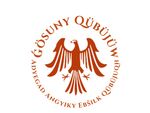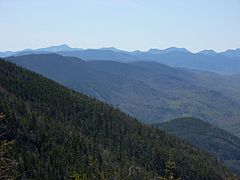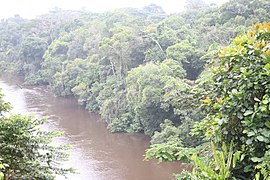Coburia
Republic of Qübüj Ǵösuny Qübüjüw | |
|---|---|
Motto: Adyegad Angyiky Ebšilk Qübüjuqh (Man's Blood Has Been Spilt Here) | |
Anthem: Ő Angyöd Qübüjüw | |
| Capital and largest city | Qhül |
| Official languages | Qübün |
| Ethnic groups | Qübüji Aröqh |
| Religion | Baigá |
| Demonym(s) | Qübüji |
| Government | Unitary republic |
| Garáš Aföčny | |
| Qhodüll Agy | |
| Müngyö Linyaföqh | |
| Legislature | The Republican Senate |
| Equestria | |
| Pedestria | |
| Establishment | |
| 803 | |
| Population | |
• Estimate | 16,104,362 |
| GDP (nominal) | estimate |
• Total | 129,527,383,566 |
• Per capita | 8,043 |
| Gini | 42 medium |
| Currency | Qübüji Lira (₺) |
| Driving side | right |
| Internet TLD | .qub |
Qübüj, officially the Republic of Qübüj, is a Republic in XXX. It is neighbored by XXX, XXX, and XXX.
The nomadic Qübüji people known as the Coburii migrated to modern-day Qübüj after a series of earthquakes in their homeland, displacing the local Andior people. After several centuries of disunity, the Coburii were united under the Kingdom of Qübüj, later conquering much of the surrounding regions before collapsing in the mid-8th century. The Fourth Kingdom of Qübüj would be reunited in 803 under King Agyöš III Mallányi. Qübüj was briefly among the powers of XXX until its steady decline after the Maqhös Wars in the early 13th century. Qübüj would remain completely independent until the late 19th century, after King Obüngyóróč II Algáracöwönt submitted to XXX dependency, though Qübüj was never formally integrated into XXX. After the decline of the XXX empire, Qübüj would regain complete independence, though public opinion of the monarchy was shattered. In early 1975, following a series of anti-monarchist riots, a pro-democracy revolution led by Garáš Aföčny began. King Ógóngü Algáracöwönt submitted to the revolutionary demands in August, and was exiled to XXX.
A legislature was established by the revolutionary leader Úbor Ranya in 1979, which quickly voted Aföčny into power. However, Aföčny has since dismantled and weakened the legislature and Ranyaist democracy established in Qübüj, and is a de facto autocrat. Qübüj ranks poorly in economic equality, quality of life, and GDP per capita, and has undergone several economic collapses in recent years. Qübüj has ample mineral and fossil fuel reserves, but its mining industry collapsed after the banning of asbestos in many neighboring nations, asbestos having been Qübüj's primary export.
Qübüj is a member of the League of Nations.
Etymology
The name Qübüj (/qʰʏpʏt͡s/) comes from the ancient Coburii (Qübün: Qübu/qʰʏpʊ/) tribes of the eastern regions of modern-day Qübüj. In the medieval period, the Coburii would unite and fracture multiple times, until the formation of the Kingdom of Qübüj by Agyöš I Mallányi in 451. The Coburii would later conquer the western Aröqh peoples, and the Kingdom of Qübüj-Aröc would be declared in 622. The name would return to Qübüj during the twelfth century under King Ülgye Llűnǵ. In accordance with the Coburii, some regions in Levantia refer to Qübüj as Coburia.
History
Early history
The Coburii tribes of central XXX migrated eastward into Qübüj in the mid-6th century BCE following the Unüfaqh Disaster. The nomadic Coburii were organised into small roving bands called agöm consisting of a patriarch and his extended family. These patriarchal clans largely settled around the highlands and hilly regions of the west of Qübüj. These gradually coalesced into larger roving bands under the rule of a council of powerful patriarchs, though the clans were known to frequently fracture after conflict between the patriarchs. Under the leadership of patriarch Agyöš bör-Aingűd Mallányi, the Mallányi clan expelled the native Andior peoples from the more fertile eastern regions of Qübüj in 276 BCE. Agyöš would initiate the change of the Coburii from hunter-gatherers into nomadic ranchers and equestrian warriors. By the 3th century CE, the Mallányi would be the most powerful of the agöm. The patriarch of the Mallányi was the de facto leader of the cattle-raising eastern tribes collectively known as the Qübu, or True Coburii, while in the western highland regions the disparate hunter-gatherer Aröqh lived. In 212 CE, the Mallányi patriarch Ábás attempted to unite the Qübu after calling a council of the Qübu patriarchs. However, the new Kingdom of Mallányic fractured quickly due to a series of mutinies among the patriarchs, and civil war broke out in 219, resulting in Ábás' death and significant territorial losses for the Mallányi.
The patriarch of the Ügyúny clan, Qhöče, began a series of wars against the reeling agöm in 223 CE, rapidly conquering much of the Qübu before his death in 228. His grandson, Andya would later subjugate the plurality of Mallányi territory by 241, and declared himself King of Ügyúnyöj at the site of Agyöš Mallányi's grave. Upon Andya's death in 252, his sons Andya II and Pürqhu fought over the succession of the kingdom, leading to its collapse in 256. The Mallányi would swiftly reclaim their lost territory during a number of conquests in the late 200s, almost completely absorbing the lands of the Ügyúny by the turn of the century.
During the early fourth century, an intense rivalry erupted between the northern Mallányi and southern Anyöqh clan for unknown reasons, resulting in a series of border skirmishes leading up to the First War of Any-Mallányic in 336 CE. After prolonged war and the deaths of hundreds of warriors following the Battle of Ǵarpöri in 349, the two clans reached a stalemate and agreed to a truce. The Second War of Any-Mallányic would erupt in 372 after the seizure of goods from a group of Mallányi Baigá monks by the Anyöqh, and would last until 376. In 432, the Mallányi patriarch Agyöš bör-Gunül would begin the final war and invaded the Anyöqh. After the Mallányi victory at Aigöǰ in 439, the Anyöqh patriarch Eny surrendered. After conquering the Anyöqh cadet branch of Rága in 451, Agyöš would be coronated as the first King of Qübüj, Agyöš I Mallányi.
Third Kingdom of Qübüj
Fourth Kingdom of Qübüj
Kingdom of Qübüj-Aröc
Fifth Kingdom of Qübüj and gradual decline
Modern history
Geography
-
First lovely location
-
Second lovely location
-
Third lovely location
-
Fourth lovely location
-
Fifth lovely location
-
Sixth lovely location
What is the general explanation of how your country exists within the world?
Climate and environment
Is your country hot or cold?
Government and Politics
How is your country ruled or governed?
Executive
Who is responsible for making high level choices in your country? Does it have a President or King?
Legislative
Who decides the laws for your country? Is there political parties and a legislature?
Federal subdivisions
How is your country divided? Are there states or provinces, or is the country directly governed from the capital as a unitary state?
Politics
What political factions exist? Who has ruled predominantly?
Law
What kind of laws and legal system does your country employ?
Demographics
What kind of people live in your country?
Ethnicity
What ethnic groups make up your country?
Language
What language or languages do your country's people use? Are there any previously used languages no longer common? Are these languages native to your country or shared with another?
Religion
Religious affiliations in Qübüj (2016)
What do your country's people believe in religiously, if anything? How many groups are there?
Education
How many people in your country are educated?
Culture and Society
What do your people do, and what are they like?
Education
What is your country's education system like? How do the schools work? What do people think about education?
Attitudes and worldview
How do your country's people view life?
Kinship and family
How are families or kinship groups structured in your country?
Cuisine
What do your people eat?
Religion
What do your people believe? Rather than demographics, as above, think about how important religion is to your people and their view about their own and other religions. What is the relationship between the prevailing view and minority religious groups? Is it an official religion, and do any laws exist about free worship?
Arts and Literature
What type of art do your people make? Do they have a tradition of painted art, well-crafted television shows, or great music?
Sports
Does your country have any major sports leagues? What types of sports are played, both professionally and for fun by your country's people?"
Symbols
Are there any prominent symbols which are well known to represent your country?
Economy and Infrastructure
How does your country's economy work?
Industries and Sectors
What are the largest parts of your economy in terms of what they do?
Currency
What exchange systems are used within your country's economy?
Healthcare
How do people in your country procure medical care? How is it paid for?
Labor
How is labor organized within your country? Are there any social institutions or unions which deal with labor concerns?
Transportation
How do people in your country get around? Is there a major highway system as well as sea- and airports?
Energy
What type of energy keeps your nation going? Are you renewable or use fossil fuels, and if you are renewable, how recently did your country transition?
Technology
How advanced is your country? Is it an innovator, or does it largely import new developments?
Military
How large is your country's military? Is it large but poorly equipped or small and elite? Does your country have a martial tradition?







